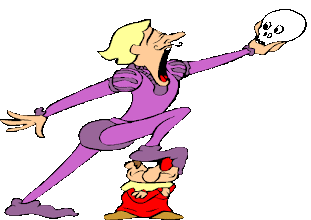What the heck, you might be asking yourself, does an actor do with an acting degree while writing novels (or working in software)?
Fair question. Think of the acting degree as the most expensive three years of intense therapy you can imagine. It's so intense that of the 20 people who started the acting conservatory the same time I did, only 8 made it to graduation. (Our graduating class was 10 people - we'd picked up a pair of students who'd taken a break and were coming back to finish up their degree work.) Yes, Cornish taught us craft and technique, but above everything, Cornish dumped us face first into the sea called "Acting requires enormous emotional effort." The conservatory's job was to crack each of us like nuts and open us up so we could finally see inside. It wasn't easy and it was often unpleasant. But it was necessary. We had to be able to name every nuance of emotion whether we felt it or believed we saw it in someone else in class. To do that, we had to rummage around inside our own emotional lives and examine every shadowy don't-want-to-admit-we-feel-that feeling we had. Ask me sometime about the incidence of raging nightmares in students during this work. I'm not trying to make it sound like a torture chamber because if you come to the work with a sense of curiosity, it's a lot of fun finding out what makes you tick and learning to parse yourself into useful bits of a toolkit.
In regard to using the degree off stage, it turns out that once you've learned what you've learned at Cornish, it doesn't go away. The ability to name emotion or to reach for a part of yourself as if it were a wrench becomes inextricably bound up in the fabric of who you are. That means that in working for corporate America, it's easier to approach public speaking, to convey confidence, and to identify the surface emotions of the people around you.
It's no stretch of imagination to think of using an acting degree for writing novels. They are both (for me) character-driven work. I suspect if we polled all the writers in the world who were or are also actors, we'd find they're all character-driven. (I'm willing to be proven wrong.) For me, though, it's more than that. Yes. I'm entirely character-driven. The emotional work means better depth and breadth of emotion in my writing. When I'm doing it right. The technique work means I dedicate time to working on each character's unique voice and physicality - how they perceive their world and how they move through it. For me, a scene is a stage. It means I'm responsible for clear, crisp stage directions in my work. I will always mess this up a little - this is why editors are so important - having that objective audience who can say 'whoa what just happened there?' I came away from Cornish with a stage combat certification that I put to work for every single fight scene in a book.
If pressed to pick the one thing that has had the single biggest impact on me, I'd say the emotional work. Hands down. It's also the work that has had the biggest impact on the people around me. Certainly I wrote before and during school, but I do feel like being published would have been far less likely without the work.

